SMS Marketing Guide: Building Text Campaigns That Convert

Traditional channels such as email and social media have become saturated. Messages get lost, ads are skipped, and posts disappear within seconds.
What often gets overlooked is the one channel customers continue to check throughout the day: text messaging. It's conversational and trusted, which makes it one of the most responsive forms of communication available to modern businesses.
But putting texting into practice can feel overwhelming. Crafting messages that resonate, keeping campaigns compliant, and managing contact lists all require structure and consistency.
In this guide to SMS marketing, you will learn effective SMS marketing best practices. You'll know how to write messages that capture attention and track meaningful metrics that reflect real engagement.
Is SMS Marketing Effective for Businesses?
Short message service (SMS) marketing continues to outperform other marketing channels in visibility and engagement. The table below shows a side-by-side comparison of SMS marketing against multiple platforms.
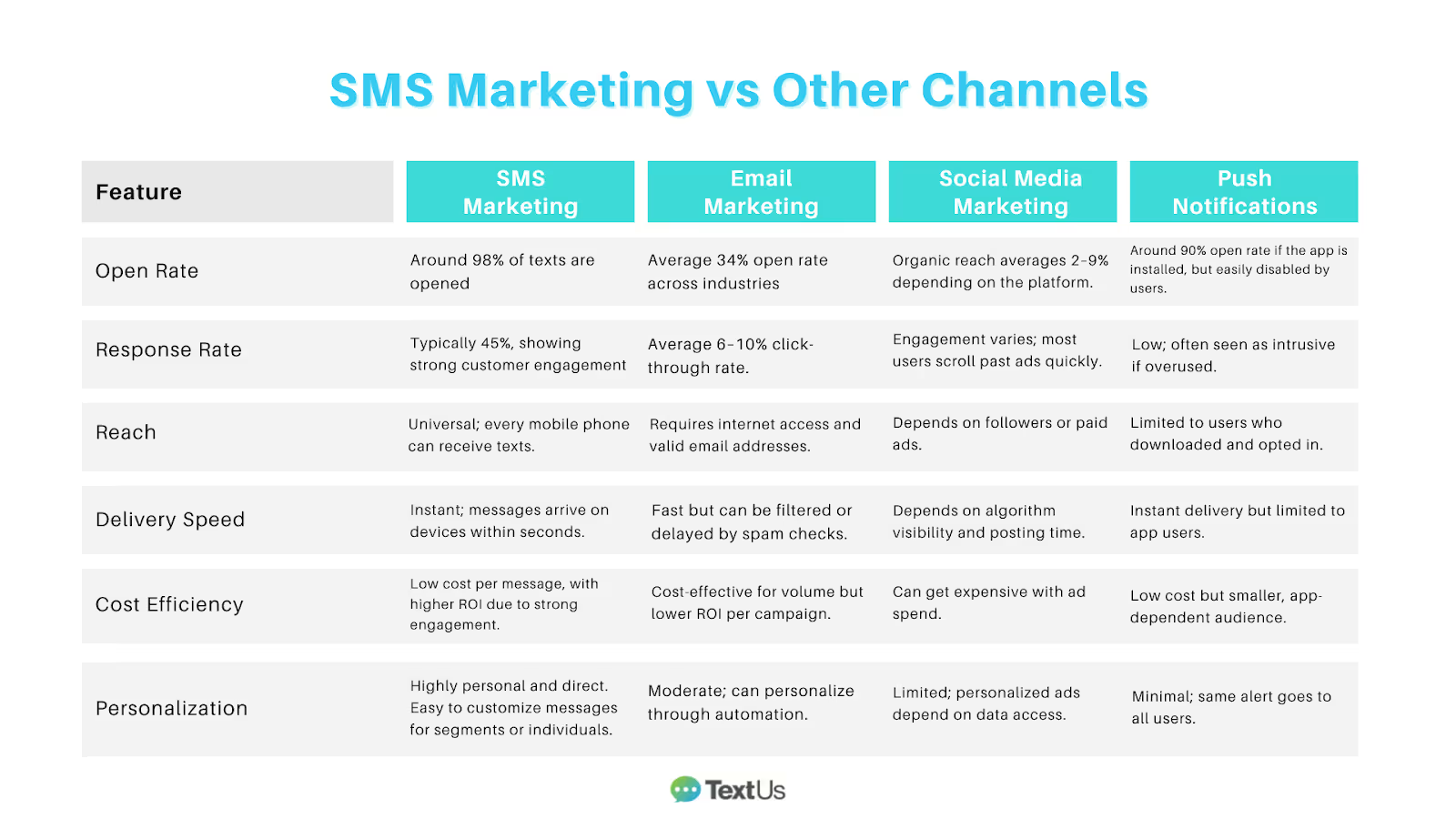
While email marketing and social media rely on algorithms or user behavior, text messages reach people directly. This difference alone shows why many companies are shifting their focus toward the benefits of SMS marketing.
Beyond open rates, the speed of interaction also makes texting more effective for businesses.
Customers respond to texts within minutes on their mobile devices, while emails can sit unread for hours or even days. Instant communication helps you confirm appointments and remind customers about time-limited offers faster.
Text marketing can also strengthen other channels when used strategically. A text reminder can increase email open rates or drive more engagement to social media campaigns.
Many companies use SMS as the final nudge that converts interest into sales. When paired with a strong CRM or an SMS marketing platform, you can schedule, personalize, and track campaigns easily, with an opt-out option included.
Types of SMS Marketing Campaigns
Each type of message meets a different customer need, from promoting products to improving engagement and retention. Below are the most common types and a few SMS marketing examples to inspire your campaigns.
Promotional Campaigns
Promotional messages aim to grab attention and drive fast action. They usually feature discounts, flash sales, or limited-time deals that motivate customers to respond quickly.
You can also send promotional text messages to highlight new arrivals or exclusive drops to your SMS subscribers.
Examples
- “Flash Sale! Get 20% off all skincare products until midnight: [link] – GlowBeauty”
- “Your favorite jeans are back in stock! Free shipping today only: [link] – DenimHub”
- “BOGO Deal! Buy one pizza, get one free. Order now: [link] – SliceStreet”
These SMS marketing campaigns help boost revenue, especially when combined with well-timed social or email promotions. Dedicated SMS marketing tools can help you schedule and automate these messages for maximum reach and timing.
Transactional Campaigns
These are informative SMS marketing messages that confirm actions or share important updates. Transactional messages build trust and keep existing customers in the loop.
Examples
- “Your order #10239 has shipped! Track it here: [link] – HomeGoods”
- “Hi Sarah, your appointment with Dr. Lewis is confirmed for Fri, 2 PM. Reply C to confirm.”
- “Payment received! Your invoice #4598 has been processed. Thank you for choosing QuickPay.”
Since these messages often trigger automatically, integration between your SMS platform and CRM or ecommerce tools is helpful. That connection saves time and prevents missed updates.
Customer Engagement Campaigns
These campaigns focus on maintaining relationships instead of driving immediate sales. Examples include asking for feedback, running surveys, or sending thank-you messages after purchases.
This is where conversational SMS marketing can deepen relationships by inviting quick replies.
Examples
- “Thanks for visiting today! Rate your experience 1–5 to help us improve.”
- “We appreciate your loyalty! What’s one thing we could do better? Reply with your thoughts.”
- “Hey there! What new item would you love to see next? Reply A, B, or C.”
Engagement messages keep communication active and open. They also provide useful insights that help you adjust your marketing tone and customer service.
Loyalty and Retention Campaigns
Once you’ve earned a customer, SMS can help keep them. You can send loyalty campaigns, exclusive offers, or early access to new collections to make customers feel valued.
Examples
- “As a valued member, enjoy 25% off your next order! Use code VIP25: [link].”
- “We miss you! Here’s 15% off your next visit — come back soon: [link].”
- “Early access for members: Shop our spring collection first! [link].”
These campaigns help build long-term trust. Sending personalized offers based on past purchases adds more meaning to these texts.
Event and Appointment Campaigns
Service-based businesses rely on text messages to confirm appointments or promote events. These messages reduce no-shows and increase attendance.
Examples
- “Reminder: Your massage appointment is tomorrow at 3 PM. Reply C to confirm or R to reschedule.”
- “Don’t forget! The webinar starts today at 2 PM EST. Join here: [link].”
- “See you at our wine tasting this Friday! Reply YES to RSVP.”
Even a simple follow-up after the event can leave a positive impression.
Building an Effective SMS Marketing Strategy
An SMS marketing strategy is the framework that guides how and when your business sends text messages to customers. With a bit of planning and the right approach, SMS can become one of the most dependable parts of your marketing system.
1. Define Measurable Goals
Instead of sending marketing messages to stay active, think about what kind of action you want your target audience to take. Do you want more sales, more bookings, or stronger customer loyalty?
Goals also make it easier to measure success. If you aim to boost repeat purchases, you can track redemption rates for coupon codes or links clicked through your SMS campaigns. If your focus is on engagement, you need to measure reply rates and conversation starts.
Having one or two main goals per campaign helps avoid confusion and gives you a direction when reviewing results later. Without this step, you risk sending random messages that don’t connect with what customers need.
It also helps to align your SMS marketing program objectives with broader marketing channels. Promotional SMS marketing works best when it supports what’s already happening through email marketing or social media.
For example, if you’re running a weekend sale through Facebook ads, your SMS reminder can create a direct push to drive last-minute traffic. Each channel plays a part in the bigger picture, and having set goals keeps everything working together instead of competing for attention.
2. Understand and Segment Your Audience
Sending generic bulk texts to everyone might save time, but it rarely drives strong results in text message marketing.
Understanding who your customers are and dividing them into smaller groups allows you to send relevant messages that feel personal and timely.
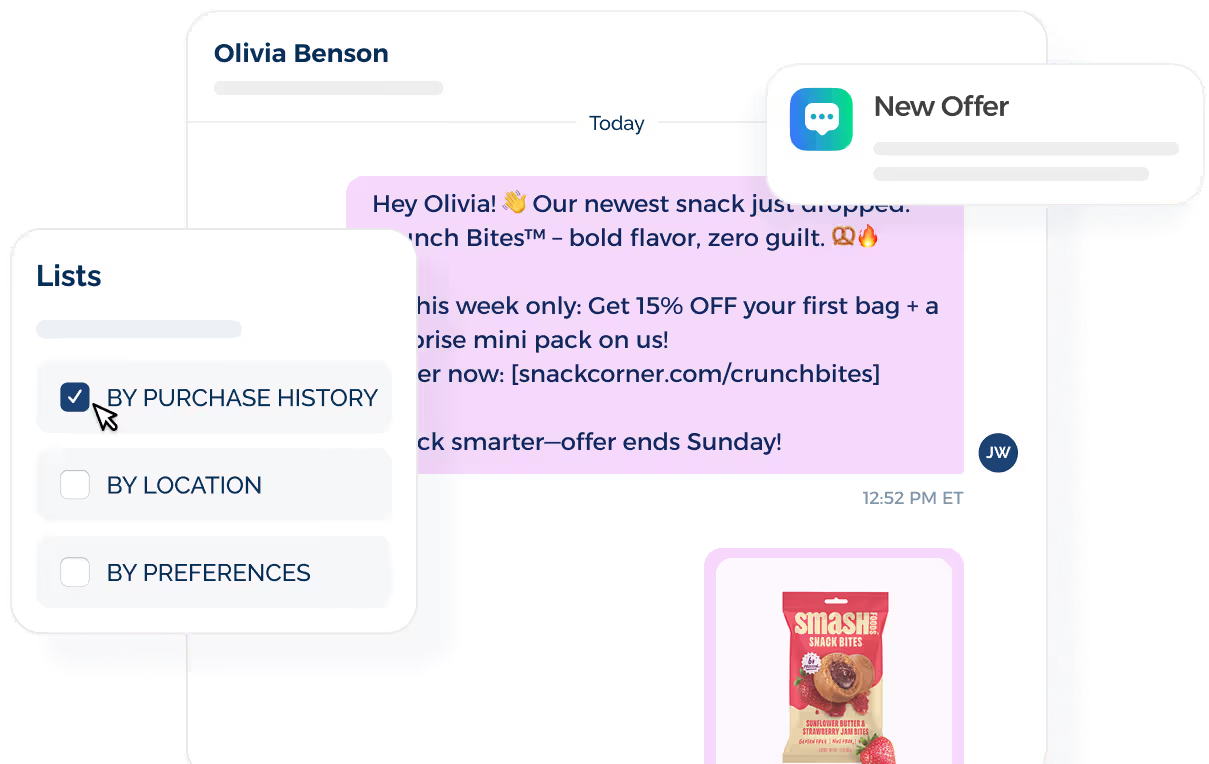
SMS segmentation can be simple at first. Start by grouping customers by demographics (age, gender, or location), customer data (recent purchases, clicks, or visits), and engagement (active vs. inactive users).
For example, if you're running a restaurant, you could text daily lunch offers only to customers within a ten-mile radius, while rewarding email subscribers with exclusive loyalty discounts if you're a retailer.
This level of focus improves conversion rates and keeps unsubscribe numbers low. Customers don’t feel spammed with irrelevant content, and your SMS list stays healthy.
Personalization also goes beyond inserting a first name. Consumers are likely to engage with brands that send targeted messages. This proves that segmentation impacts engagement and sales.
You can use an SMS marketing platform for tagging and organizing contacts automatically based on data like purchase activity or signup source. You can then send marketing messages without sorting through long lists manually.
Over time, you’ll notice patterns of which groups buy more often, who responds faster, and what type of content creates the most replies. The better you understand your audience, the stronger and more profitable your SMS marketing becomes.
3. Craft Short and Action-Focused Messages
Every text you send should have a purpose, and that purpose should be evident within seconds of opening the message. People read texts fast, so long explanations or complex sentences don’t work.
The most successful SMS marketing campaigns use simple language that delivers value instantly.
Think of your text as a direct line to the customer. You can lead with value such as a discount, a reminder, or a benefit that matters to the reader. Then finish with a clear call to action (CTA) that tells them what to do.
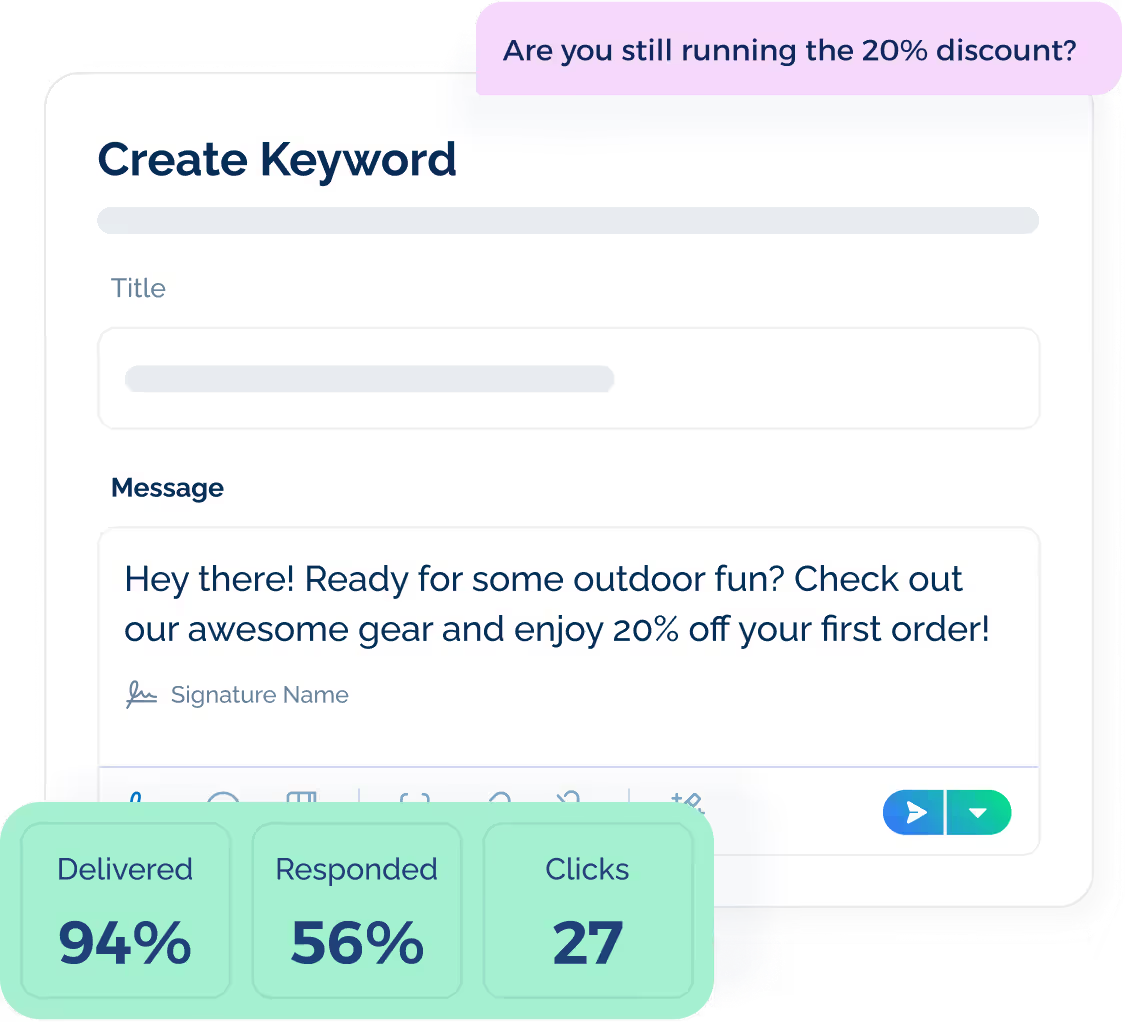
It’s also smart to keep your tone conversational. Text messages are personal by nature, so speak the way your customers would. You can use friendly words like “Reply YES,” “Tap to book,” or “Claim offer now.”
According to Bloomreach, SMS marketing delivers an average click-through rate (CTR) of 19%, far higher than other marketing channels. This shows that short, action-focused messages get attention without sending too many messages.
4. Build a Quality Opt-In List
A strong SMS program starts with a high-quality list built on trust and permission. It keeps your brand credible and helps maintain a clean list of people who genuinely want to hear from you.
You can use signup forms, keyword QR codes, or website pop-ups to collect SMS opt-ins. When customers join, mention that message and data rates may apply and that they can unsubscribe anytime.
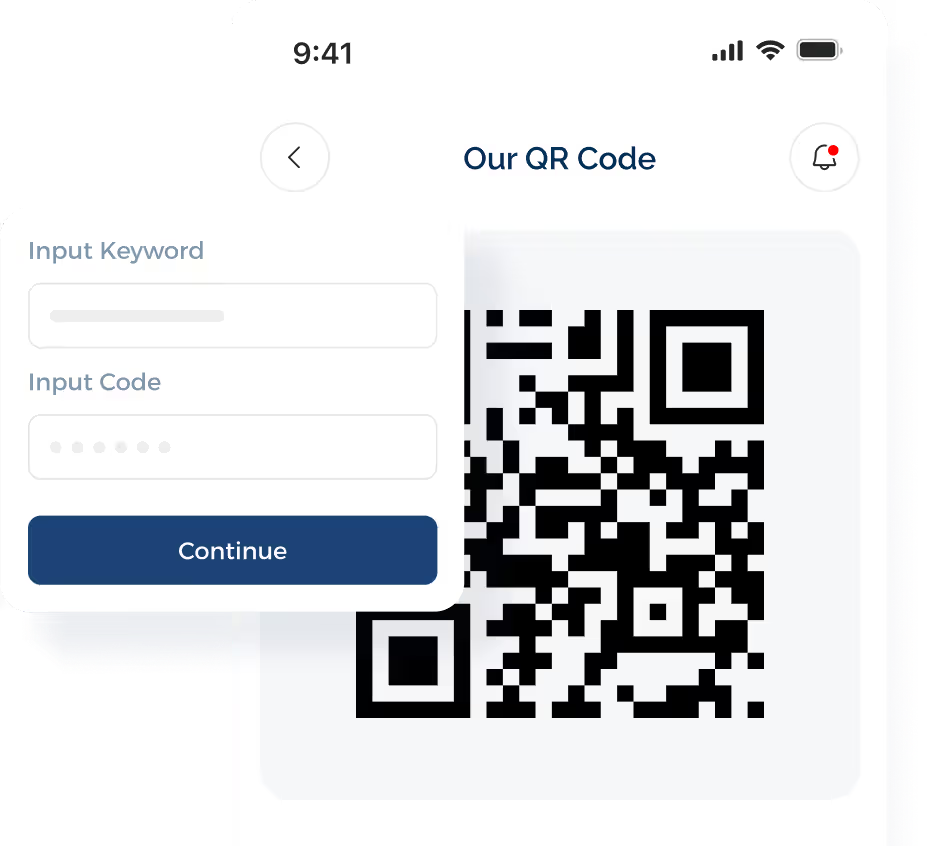
You can make your sign-ups more appealing by offering incentives such as discounts, early access to sales, or exclusive content.
You can also encourage subscribers to share their experiences or reviews, which adds valuable user-generated content that promotes trust and authenticity.
5. Maintain Compliance at All Times
No matter how creative or engaging your campaign is, it should comply with the Telephone Consumer Protection Act (TCPA) and the CAN-SPAM Act. These are designed to protect consumers from unwanted or misleading messages.
Always be transparent about what subscribers can expect when they opt in. Let them know that message and data rates may apply, and state how often they’ll receive texts.
Every message should include an easy way to unsubscribe, such as replying “STOP.” This keeps your brand compliant while also showing respect for your audience’s time and preferences.
When customers opt in, make sure you explain what they are signing up for. Tell them how often they’ll receive texts, that message and data rates may apply, and that they can unsubscribe anytime.
Using a trusted SMS app like TextUs can simplify text message compliance management by automatically tracking consent, managing opt-outs, and storing documentation of written consent.
6. Use the Right SMS Marketing Platform
The platform you choose plays a big part in how successful your SMS marketing strategy will be.
A good platform should offer features such as contact segmentation, campaign automation, and performance tracking. These help you create smarter, data-driven marketing efforts that build stronger customer relationships and help protect consumers.
TextUs is a complete SMS marketing software solution built for real-time communication between businesses and customers. It combines automation, personalization, and team collaboration in one place that can turn conversations into conversions.

With TextUs, you can manage everything from promotional SMS messages and appointment reminders to personalized follow-ups without switching tools.
Here’s a closer look at the features that make TextUs stand out:
- Automated drip campaigns: Schedule and send sequences of messages to nurture leads automatically while keeping communication personal
- User-friendly apps: Access your campaigns and alert customers anywhere on mobile, in Chrome, or through the online dashboard
- Simple setup and clear organization: Get started quickly, manage conversations neatly, and track key details without hassle
- Shared inboxes: Allow multiple team members to collaborate and reply to messages in real time, keeping every lead engaged
- Texting templates: Create and reuse message templates to save time and maintain consistent communication
TextUs helps you communicate faster, stay organized, and improve customer engagement through one platform designed for real-time, two-way marketing.
Ready to see how TextUs can strengthen your SMS marketing strategy? Book a demo today!
7. Monitor, Test, and Improve
Many marketers make the mistake of setting up automated texts and forgetting about them. But SMS marketing works when you keep refining it.
Regular analysis helps you see what resonates with your audience, what needs fine-tuning, and how to grow your results over time.
Start by tracking a few key metrics. The most common ones include delivery rate, CTR, response rate, and unsubscribe rate.
For example, if you’re sending promotional texts and see a CTR of around 19%, that’s considered strong compared to most marketing channels. A lower rate may mean your messages aren’t appealing enough, or perhaps your SMS timing is off.
Testing is where the learning happens. You can try A/B testing by sending two versions of a message to different groups. You might change only one variable at a time, such as the call to action, time of day, or type of offer.
Over a few campaigns, you’ll notice which combination drives more responses. The data you collect helps you refine your future texts for stronger results.
Upgrade Your Outreach With Real-Time SMS Messaging—Try TextUs!
The power of text messaging is evident. It’s fast, personal, and gets read almost every time. But creating compliant and engaging SMS campaigns doesn’t have to be complicated.
TextUs gives you all the tools you need to connect with customers in real time, build stronger relationships, and turn texts into measurable results.
With TextUs, you can run campaigns, send personalized texts, and track every response from one easy dashboard. It’s built for real-time communication, so you can reach customers fast, manage shared inboxes with your team, and never miss a lead.
Features like automated drip campaigns, ready-to-use templates, and CRM integration keep your marketing organized and efficient. Whether you’re promoting offers, following up with leads, or sending reminders, TextUs keeps your messages on point.
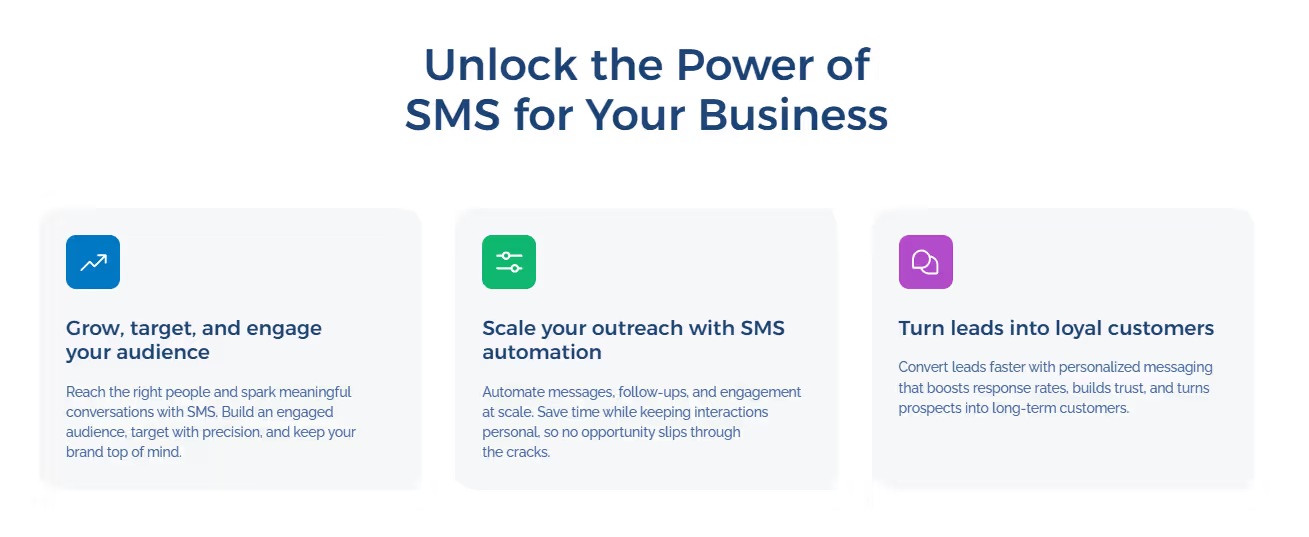
Book a demo with TextUs today and see how simple it is to connect, convert, and keep your customers coming back!
FAQs About SMS Marketing
How do you do SMS marketing?
SMS marketing begins with collecting express written consent and phone numbers from customers who have agreed to receive updates. Once you’ve built an opt-in list, use an SMS platform to create, schedule, and send your marketing texts.
Start with a welcome message, follow with occasional offers or updates, and keep every message short and clear. You can also gather new subscribers through website pop-ups. Following this structure keeps your customers engaged while maintaining trust and compliance.
Is SMS marketing's 98% open rate?
Yes. Studies consistently show that around 98% of SMS messages are opened. Most texts are read within minutes of delivery.
This high open rate comes from the personal and immediate nature of texting, as people check their phones often, and future messages arrive right in their default inbox.
Is SMS marketing illegal?
SMS marketing is legal when done correctly. You must follow regulations such as the TCPA in the U.S., which requires obtaining consent before sending messages.
Every promotional text must include clear identification of the sender and a way for recipients to unsubscribe, usually by replying “STOP.”
These compliance steps protect your business and consumers, especially when handling sensitive customer behavior data or managing shipping updates. As long as messages follow these rules and include proper written consent, SMS marketing remains lawful and trusted.
Does anyone use SMS anymore?
Absolutely. Despite the rise of apps and social media, SMS remains one of the most widely used forms of communication. It doesn’t require internet access or app downloads, which makes it reliable for reaching any audience.
Businesses across industries still depend on SMS for confirmations, reminders, and promotions because it’s direct and personal.
.avif)
Continue Reading
Frequently Asked Questions
Business Texting
Built for Results
Create and convert pipeline at scale through industry leading SMS software




